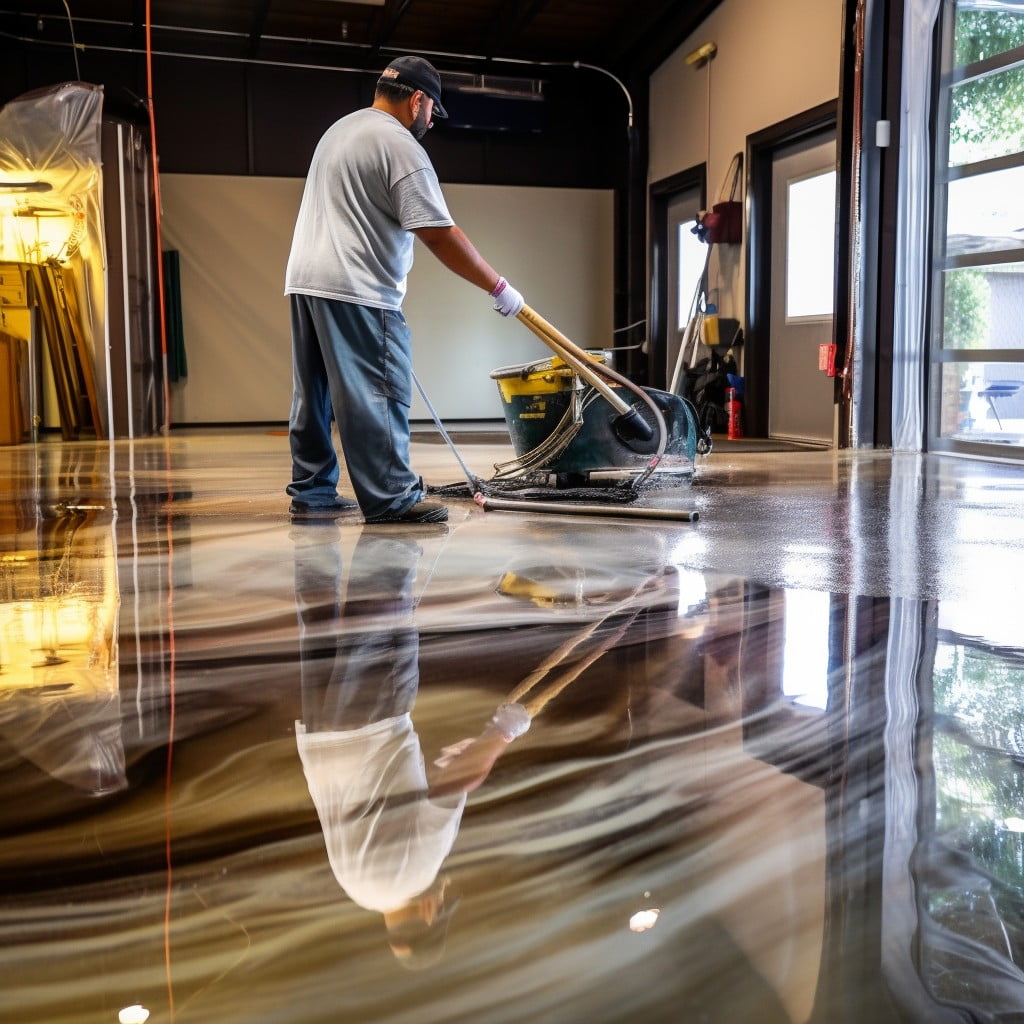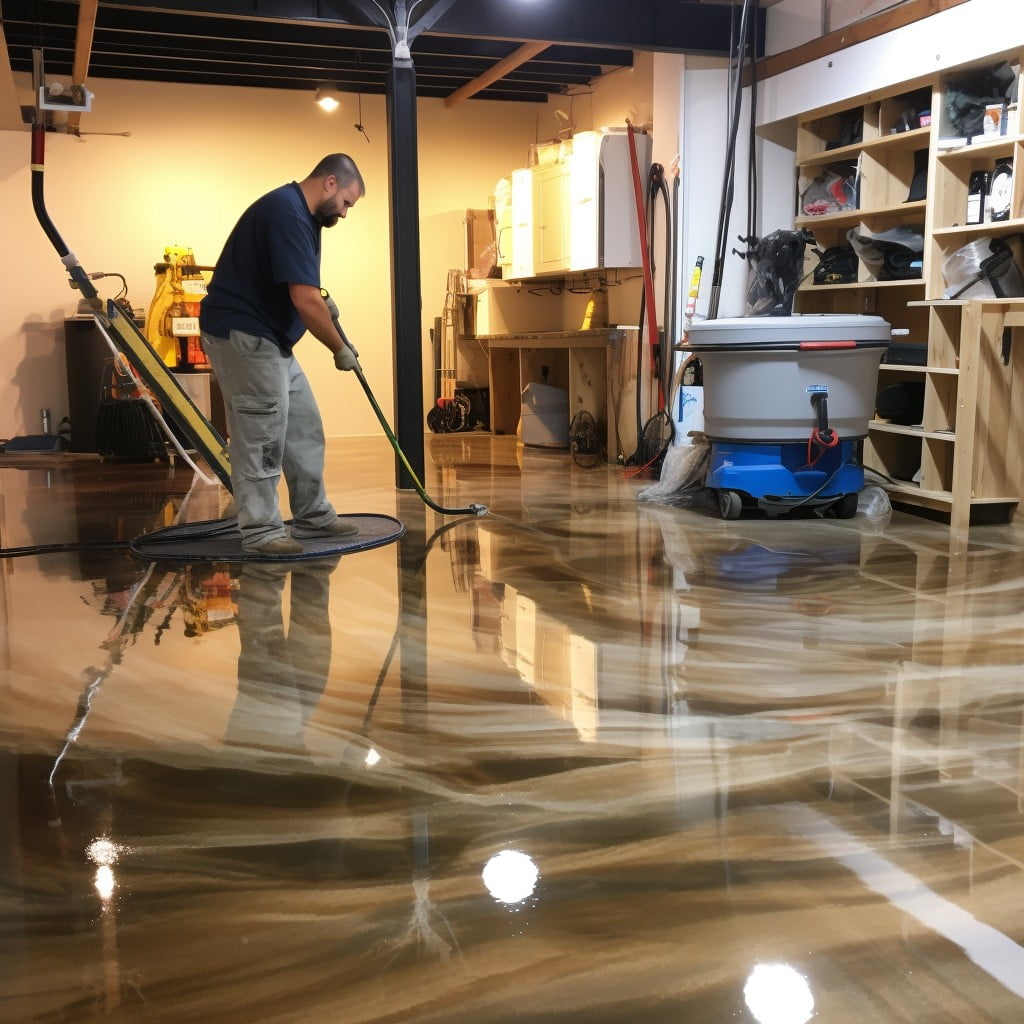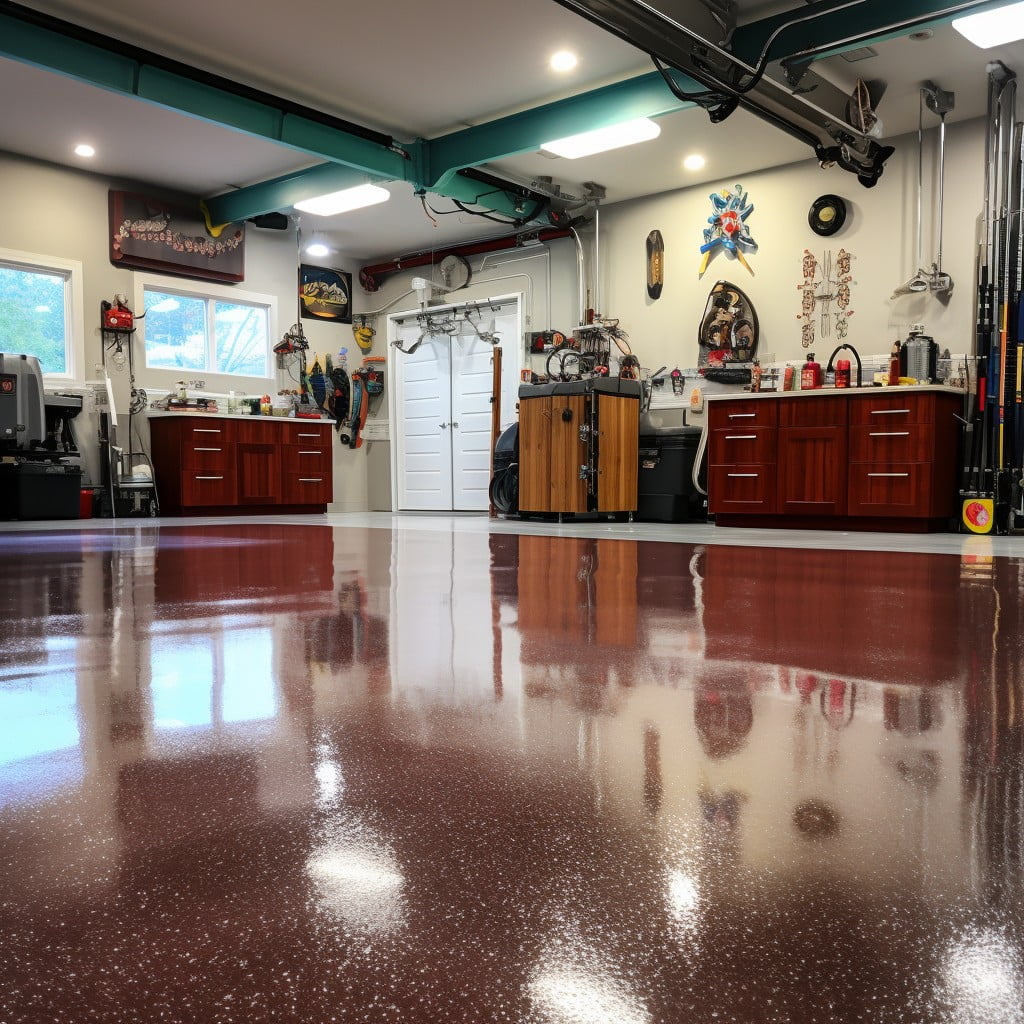Discover how to effectively clean your epoxy garage floor and maintain its durability and shine for years.
Cleaning an epoxy garage floor may seem like a daunting task, but it’s actually quite straightforward once you know the right steps. This task involves routine maintenance, spot cleaning for spills or stains, and periodic deep cleaning to maintain the glossy finish and extend the lifespan of your epoxy floor.
This article will provide you with a detailed, step-by-step guide on how to effectively clean your epoxy garage floor, ensuring it continues to look as good as new. Whether you’re dealing with dust, dirt, or oil stains, you’ll find practical solutions here.
So, keep reading to discover the best practices and products for cleaning epoxy garage floors.
Key takeaways:
- Regular sweeping to prevent scratches and wear patterns.
- Monthly dry mopping to keep the floor gleaming.
- Promptly clean up spills to prevent staining and erosion.
- Use mild detergents to avoid eroding the epoxy surface.
- Choose the right mop, such as microfiber or spray mops.
Understanding Epoxy Garage Floor Material

Epoxy, a thermosetting resin, serves as a durable and resilient flooring option for garages. When mixed with a hardening substance, it creates a chemical reaction producing strong, resistant material.
Its durability tackles heavy equipment and cars, while the non-porous surface simplifies cleanups from spills and stains.
Offering high-gloss finishes, epoxy can enhance brightness by up to 300%, significantly invigorating your garage space.
Additionally, it’s available in a variety of colors and designs, catering to diverse aesthetic tastes.
Its concrete bonding strength in combination with endurance to wear and tear, and resistant properties to chemicals, oils, and grease, make it an ideal choice for long-lasting garage floor protection.
Epoxy Floor Cleaning and Maintenance

Maintaining the pristine condition of an epoxy garage floor demands an uncomplicated yet methodical approach. With the appropriate tools and procedures, your floor can retain its stunning finish for many years.
1. Regular Sweeping: Dust and dirt can cause your floor to lose its luster over time. Sweeping your garage floor at least once a week helps avoid scratch and wear patterns.
2. Routine Mopping: In addition to sweeping, a monthly mop can keep your floor gleaming. A dry mop is most effective for this process.
3. Prompt Spill Cleanup: Oil, chemicals, or even water spills can damage the epoxy layer. Immediate cleanup of spills can help to prevent staining and erosion of the top layer.
4. Gentle Cleaning Solutions: Always opt for mild detergents over harsh chemicals for cleaning. Strong chemical solutions can erode the epoxy surface, dulling its glow.
Remember, epoxy floors are hardy, but they’re not indestructible. Regular upkeep and gentle cleaning go a long way in preserving their resilience and aesthetic value.
Proper Techniques On How to Clean an Epoxy Garage Floor

To begin, remember to always keep dirt and grit in check. Frequently sweep or use a blower to remove debris that can abrade the surface. Wet mopping is also important. Use a foam mop instead of a string mop, which can leave streaks.
Next, scheme occasional deep cleaning. Use a hard foam mop along with a mild, non-acidic, and non-corrosive cleaner. Always avoid soap-based or vinegar cleaners. Scrub the floor gently and thoroughly, paying particular attention to more exposed or dirty areas.
Spills should be handled immediately to prevent staining. Use a soft cloth or paper towel to wipe the spill up and then clean the area with a mild cleaner.
Remember, harsh chemicals can be harmful. If you’re dealing with stubborn stains, avoid using any chemical without first ensuring it’s safe for epoxy. A simple paste made of a mild cleaner and water can be used for tough stains.
Last but not least, maintenance is constant. By sticking to a regular cleaning schedule, you can keep your epoxy garage floor looking its best while increasing its life span.
Recommended Cleaning Solutions for Epoxy Garage Floors

The most effective and safe cleaning solutions for epoxy garage floors include a mix of 1/2 cup of ammonia with a gallon of hot water for general cleaning, or traditional dish soap for stubborn spots.
Baking soda and vinegar also work wonders for difficult stains: apply the baking soda first and then spray with white vinegar, let it bubble, then scrub away the stains.
A mild dishwashing detergent mixed in warm water can be used for light cleaning, while a mild degreaser or commercial epoxy floor cleaner can be used for grime and oil.
Remember, never use soap-based cleaners or acid-based cleaners as they can dull the epoxy finish.
Commercially available epoxy maintenance kits further simplify the process.
Also, keep in mind that even with the toughest stains, harsh scrubbing tools or steel wool should be avoided to not damage the surface.
Lastly, powdery cleansers should be used with caution to avoid scratching the floor.
Special Mops Suited for Epoxy Floors Cleaning
Identifying the correct tools is a crucial component of maintaining your epoxy garage floors, and this includes your mops. While standard string mops can do an adequate job, they may leave residues behind and aren’t as efficient as other types in fully removing grime.
Microfiber mops, on the other hand, absorb dirt and oil more effectively, prohibiting them from spreading across the floor. They have finer and softer bristles that cope well with the irregular surfaces often found in epoxy flooring, ensuring a more thorough clean.
Spray mops also serve as excellent implements for cleaning epoxy floors. Perfectly suited for quick spills and messes, their built-in sprayer allows you to conveniently clean the area without the need for a bucket.
Lastly, steam mops are an excellent option for deeper cleans. They use heat and water to break down tough stains, but should be employed sparingly due to the potential risk of moisture damage to the epoxy surface.
Bear in mind, regardless of the mop you use, the goal is to leave the surface as dry as possible to prevent watermarks and potential slipping hazards.
Do Not Use These Cleaners On Epoxy Garage Floor Coatings
While epoxy coatings are durable, their resistance to harsh chemicals might not hold up against certain cleaners. For instance, soap-based cleaners often leave residue, creating a dull film on the floor’s surface. Abrasive substances like comet and ajax can scratch and dull the coating. Also, acidic cleaners like vinegar, citric acid or muriatic acid could cause unnecessary etching and lead to premature wearing of the floor.
Additionally, avoid cleaners containing solvents like xylene or acetone as they could dissolve the epoxy. Likewise, oil-based cleaners can strip the coating, damaging its appearance and durability. Companies often infuse these cleaners with certain chemicals to give them a pleasant aroma but they can be harmful to the epoxy coating.
The same caution should apply to the use of bleach as it can degrade the structure of the coating and over time can lead to the discolouration of your garage floors. Stick to the correct cleaning materials and your epoxy floor will not only look appealing but also last longer.
Recommended Techniques for Minor Epoxy Floor Damage Repair
The repair process starts with an assessment of the damages. For minor nicks and scratches, sanding the affected area lightly may be all that’s needed. High-grade sandpaper (about 120-grit) should be adequate for this task.
Remember not to exert too much pressure and to cover only the scratched area. Dust it off and apply a thin coat of epoxy material to create an even surface. It’s essential to allow it ample time to cure before driving or walking on it.
Cracks or chipping, on the other hand, might require a more intensive approach. Clean the area around the damage thoroughly. For cracks, fill them using a high-quality epoxy resin, making sure the material infiltrates the depths of the crack. Once the resin cures, you can sand it down to keep the floor level consistent.
Chips might need you to reapply a full layer of epoxy. After removing any loose bits, clean the area, apply primer followed by the epoxy. Wait for it to dry before applying a topcoat for extra protection. Remember, patience in drying and curing is crucial in any repair job to ensure the longevity of the repair.
Always follow safety instructions when handling epoxy products, including using gloves and adequate ventilation. Also, remember color matching might be tricky, especially for older floors showing signs of fading. It’s advisable to contact professionals if you’re unsure or uncomfortable doing the repair.
Effectively Dealing With Expansion and Contraction Joints in Garage Flooring
When it comes to garage flooring, one significant aspect that cannot be ignored is the management of expansion and contraction joints. These are essentially planned gaps that allow for the natural expansion and contraction of the concrete due to fluctuating temperatures.
Here are a few crucial tips:
- Regular Inspection: Ensure these joints are inspected regularly for any signs of cracking or damage, which could be detrimental to your epoxy floor in the long run.
- Proper Filling: Utilize a joint filler material suitable for epoxy floors and flexible enough to withstand temperature fluctuations. This helps to maintain a seamless surface and prevent potential cracking.
- Limit Moisture Exposure: Try to limit any excessive water or moisture exposure, as it can seep into the expansion joints and cause premature erosion.
- Expert Assistance: If the joints expand more than expected or show significant wear, consider hiring a professional for evaluation and repair. Experts have tools and experience to ensure a lasting solution.
Remember, a well-maintained garage floor not only enhances the aesthetic appeal but also increases functionality while reducing maintenance demands.
Impact of Well-maintained Garage Flooring On Your Home’s Market Value
A pristine epoxy garage floor not only impresses potential buyers but also signals the overall upkeep of your home. Let’s delve into how this influences your home’s market value.
1. Perceived Value: A garage floor in excellent condition enhances a home’s perceived value. It gives the impression of a well-cared-for property, suggesting that the rest of the home has been equally maintained.
2. Added Aesthetic Appeal: Epoxy flooring contributes to a uniform, sleek, and modern look. Potential buyers appreciate the neat appearance and the artistic flexibility it offers, increasing their willingness to pay a premium.
3. Durability Factor: The durability of epoxy flooring suggests longevity and less future maintenance for the homebuyer, an aspect that substantially sweetens the deal.
4. Multipurpose Space: A clean, well-maintained garage can serve as more than just parking space. It can be transformed into a home gym, art studio, or workshop, providing the practical advantage of additional functional space.
5. Cost-Effectiveness: Lastly, regular cleaning and maintenance of the garage floor is more cost-effective than periodic heavy-duty renovations or repairs, and it certainly adds to the resale value of the home.
The above points illustrate why investing in maintaining your epoxy garage floor can aid in substantially boosting your home’s market value.
FAQ
What is the best cleaner for epoxy garage floors?
The best cleaners for epoxy garage floors include a mixture of five ounces of clear ammonia per gallon of water, mild dish soap in warm water, or a diluted solution of a degreaser like Simple Green or Goof Off, mixed at a concentration of one-half-cup per gallon of water.
Is it OK to pressure wash an epoxy garage floor?
Yes, it is acceptable to pressure wash an epoxy garage floor, although it's not necessarily required if the floor is extensively cleaned with dish soap or a cleaning solution like Simple Green, along with a garden hose.
How do you make epoxy floors shiny again?
To restore the shine on epoxy floors, clean the surface at least annually by rinsing with hot water and subsequently drying it with a squeegee.
Can you use dish soap on epoxy floors?
Yes, you can use dish soap to clean epoxy floors as it effectively removes dirt and grime.
What are the most common mistakes to avoid when cleaning an epoxy garage floor?
The most common mistakes to avoid when cleaning an epoxy garage floor include using harsh chemicals, scrubbing the floor intensely, using a high-pressure washer, and neglecting to protect the floor during heavy-duty tasks.
Can bleach be used to clean epoxy garage floors?
Bleach is not recommended for cleaning epoxy garage floors as it can dull the finish and damage the color.
What is the recommended maintenance routine for an epoxy coated garage floor?
An epoxy coated garage floor should be maintained with a routine of regular sweeping, damp mopping with a pH-neutral cleaner, and immediate wiping up of any spills to prevent stains and damage.